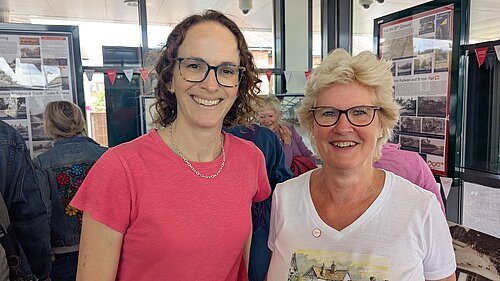Trains, planes and ID cards?

Let’s start with ID cards
The title of today’s newsletter was going to fully reference the 1980s movie, Trains, Planes and Automobiles, and keen readers will indeed find that there is an ‘automobile’ section at the end of this week’s Monday Mail.
However, upfront I wanted to put on record that I and the Liberal Democrats oppose Labour’s plans to bring in a compulsory digital ID. It’s undoubtedly illiberal, and my party has opposed ID cards of any type for decades. Aside from the principle though, as someone who generally ascribes to what my dad calls ‘the cock up rather than conspiracy theory of life’, I don’t have much faith in this or any government’s ability to bring in a major IT project successfully, on budget whilst securely looking after private data.
If you agree with me, please sign our petition: No To Digital ID.
Celebrating ‘Railway 200’ in Hassocks
On Saturday I made a flying visit to Hassocks station ticket office to join the Railway 200 celebrations. Railway 200 is the nationwide celebration marking 200 years of the modern railway since the opening of the Stockton and Darlington railway on 27th September 1825.
I had not realised that the current station at Hassocks is the fourth building they have had since the original was opened when the station was called ‘Hassocks Gate’ in 1841. It was good to catch up with Catherine from the Hassocks Rail Group, who over the years have done a great deal to speak up for those who use the station to get around.
Whilst on the subject of trains, last week I had a meeting with GTR who operate the three lines that serve Mid Sussex: Southern, Gatwick Express and Thameslink. I know from constituents that there are too many cancellations. This isn’t just an annoyance, it has a real impact on people getting to work, college and school. The executives from GTR talked me through the causes of disruption and delays which particularly affect Thameslink and Gatwick Express (more than Southern services). Often it is network faults, but on Thameslink driver sickness is a particular problem. One step that GTR told me they are taking to get drivers well and back to work, is to pay for private healthcare rather than rely on getting to the top of long NHS waiting lists. This is just one example of how having an NHS that isn’t coping with the demands it faces is holding back the productivity of the workforce and ultimately costs end users more money.
Gatwick Expansion and the impact on the ground
The Secretary of State for Transport has granted approval for Gatwick Airport expansion. This would see the emergency runway moved, and then brought into commercial use. For years I have opposed this expansion - for a number of reasons, not least that increasing air travel makes it much harder for us to meet our emissions targets.
However, I want to spend a moment considering the impact on surface transport that delivers passengers and workers to and from the airport. The roads immediately around Gatwick are not in my constituency, but they are in the district of Mid Sussex, and I know from councillors in the area that they don’t want to see more traffic jams and congestion.
For trains, the Brighton mainline runs through Hassocks, Burgess Hill and Haywards Heath before going to Gatwick and then onto East Croydon and into central London. I can see from my own journey into Westminster how jammed the carriages can get once trains get to Gatwick. In my meeting with GTR I was told that it is anticipated that by 2029 passenger numbers will return to the same levels as pre-Covid, but with fewer carriages than they had in 2019. Housing growth and more travellers in and out of the airport, will only add to these pressures.
In terms of the network, there is a delayed project to reconfigure the track and station around Croydon East. This scheme was delayed in the pandemic, and has not been brought back by the Department for Transport and Network Rail.
Put this all together, and you can see that without serious investment in the rail network that serves Mid Sussex, and the wider area, rail users will face more congestion and more delays, pushing more people onto the roads. In the months ahead I will continue to make the case for proper investment in our area’s transport network.
Twenty is plenty
During my summer tour, a theme that came up repeatedly from villages across Mid Sussex was the call for more 20mph zones. From Albourne to Lindfield, parish councils shared the challenges that they are facing in getting proposals for their villages actioned. The decision and funding for these schemes sits with the highways authority - West Sussex County Council. Following up these meetings I have written to the County Council setting out the villages’ views.
I was pleased when BBC Politics South East asked me to be interviewed for their Sunday morning programme so that I could share more widely what I had learnt over the summer. The video from Cuckfield and Hurstpierpoint is on Facebook, and if you would like to watch the whole episode, then it is on the BBC iPlayer.
As I said to the BBC, I don’t think that 20mph zones should be mandated everywhere, but I do think that local parish councils who know their villages so well, are best placed to draft sensible plans that will make our high streets more pleasant and safer for all.
Getting in touch
My parliamentary email address is: alison.bennett.mp@parliament.uk. If you need my help, please get in touch.
Best wishes,
Alison
PS: If you’ve enjoyed this week’s Monday Mail, please spread the word and tell your friends by forwarding it to them. Anyone can sign up here.